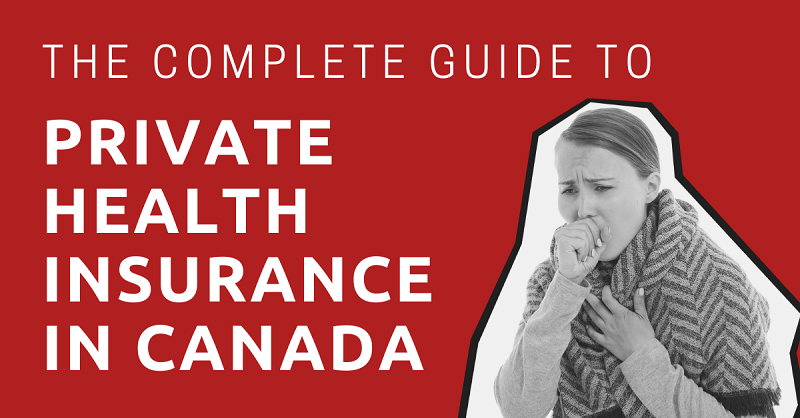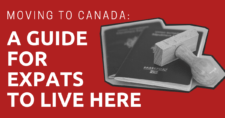
Wondering about healthcare and health insurance in Canada?
Depending on your entry status, you may be eligible for coverage under Canada’s publicly funded healthcare system, Medicare.
If you don’t happen to be eligible, or if you’re interested in supplementing your public insurance with a private plan that covers aspects of healthcare not covered by Medicare.
Here we’ll take a look at Medicare and private insurance so that it’s easy for you to navigate the system, and by the end of the guide you’ll have an idea of what plan works for you.
This article will take approximately 31 minutes to read. Don't have the time right now? No worries. You can email the ad-free version of the article to yourself and read it later!
Disclaimer: This article may include links to products or services offered by ExpatDen’s partners, which give us commissions when you click on them. Although this may influence how they appear in the text, we only recommend solutions that we would use in your situation. Read more in our Advertising Disclosure.
Contents
- Key Takeaways
- What Types of Health Insurance Does Canada Have for Expats?
- Public Insurance
- Private Insurance
- International Insurance
- Local Insurance
- How to Buy Health Insurance
- Plan Comparison
- Travel Insurance
- What is the Best Insurance Plan?
- How Much Does Health Insurance Cost per Month in Canada?
- Are Health Insurance Premiums Tax Deductible in Canada?
- Can I Opt Out of My Employer’s Health Insurance?
- Is Health Insurance Worth Buying?
- Does US Health Insurance Work in Canada?
- Now, on to you
Key Takeaways
- Canada has a good public insurance system called Medicare.
- Medicare coverage and eligibility differ between each province and territory.
- In general, expats can get Medicare only if they hold permanent resident status or have a work contract that lasts longer than 6 to 12 months.
- If you cannot get Medicare, international health insurance is usually recommended. Check out our comparison page for your option
- Local private insurance in Canada is mainly for those who want to get extra coverage that isn’t included in Medicare.
What Types of Health Insurance Does Canada Have for Expats?
As an expat, there are four main types of health insurance in Canada available to you:
- Public insurance
- Private local insurance
- International insurance
- Travel insurance
Here’s a quick overview of each option:
Public insurance, known as Medicare, offers free healthcare to those who are insured. Medicare is mainly available to Canadian citizens and permanent residents. As an expat in Canada, it’s still possible to obtain it if you study or have a work contract for at least 6-12 months.
However, Medicare’s eligibility and coverage differ among provinces.
Private local insurance, on the other hand, is for anyone who has Medicare and prefers an upgrade over public insurance. It includes additional coverage for private rooms, vision, dental, and prescriptions, as well as shorter wait times.
International insurance, on the other hand, is for anyone who moves to Canada temporarily. Expats normally choose this option if they are not eligible for Medicare or while they are waiting to obtain it.
The final option is travel insurance. As the name suggests, it is for anyone traveling and is ideal for those who plan to stay in Canada temporarily, such as tourists or working holiday visa holders.
However, the health coverage integrated with travel insurance offers limited coverage compared to other insurance types and only provides emergency coverage.
Public Insurance
Canadian public insurance, Medicare, is known to be one of the best in the world.
Canadians are proud of their healthcare system and its egalitarian ideals. Rich or poor, they have basically equal access to the free publicly funded healthcare system, Medicare, as long as they are citizens or residents of Canada.
It gives you full medical coverage in Canada and covers almost everything including pre-existing conditions, emergency coverage, cancers, and much more, as long as it is medically necessary.

It can be simply said that if you are eligible for Medicare in Canada, you might not need to buy private insurance at all, unless you need extra benefits such as a private room during hospitalization, prescription medication, or more coverage outside of Canada.
An important point to remember is that each province and territory in Canada runs its own public insurance program.
It basically means that each province and territory have some differences in coverage and eligibility.
Who Can Get Medicare in Canada?
In Canada, Medicare is mainly available to Canadian citizens and permanent residents only.
If you are an expat in Canada, it’s still possible to get it under two main conditions:
- You have a work permit and a work contract that lasts at least 6 months or 12 months OR
- You are a student enrolled in a study program that lasts more than 12 months.
Then, there’s also a resident requirement, where you need to stay in that province or territory for more than 183 days a year.
Please note that this is only a general condition.
For specific requirements, you need to visit your official province or territorial website to find out more.
How to Use Medicare in Canada
To use Medicare in Canada, you normally need to make an appointment with your family doctor and show your health card.
If a family doctor cannot treat you, you will be referred to a specialist or a bigger hospital.
How to Apply for Medicare
To apply for Medicare, you normally need to visit a province/territory service center. The following documents are usually required:
- Passport
- Resident card
- Work permit
- Employment contract
Medicare Cost
You won’t need to pay for Medicare. However, we can’t truly say that it’s completely free since a portion of your income tax will be used to fund the Medicare system.
What are the main disadvantages?
Medicare isn’t a perfect system. There are three main disadvantages:
- Long application time: in general, you are unable to get it during your first year in Canada. During that time, you need to get another type of insurance, such as international insurance, while waiting to fulfill the Medicare requirements and receive a health card.
- Waiting Time: since your first step of getting treatment is to see a family doctor, the entire process takes some time and depends on a number of factors such as the hospital where the specialist operates, the priority level of the patient’s condition, the type of medical condition the specialist is seeing, and more. If you need surgery, you may need to wait for a year to get it.
- Coverage Area: Medicare only covers your treatment in Canada. In addition, if you get treatment outside of your province/territory, you may need to pay out of pocket first and make a claim later. And Medicare might not be able to pay you in full.
Should I Use Medicare?
In general, if you are eligible for Medicare, it’s a good idea to use it, especially when you plan to live in Canada long-term. While the waiting time and application procedure can be long, it’s totally worth it.
With it, you won’t need to worry anymore about going bankrupt due to expensive treatment.
In case you can get a permanent resident card, Medicare is a great system since you can keep getting medical care even if you lose your job.
Useful Medicare Links
Below is a list of official government healthcare websites for each province and territory in Canada, where you can find information about Medicare and other health services:
- Alberta: Alberta Health Services
- British Columbia: HealthLink BC
- Manitoba: Manitoba Health, Seniors and Active Living
- New Brunswick: New Brunswick Medicare
- Newfoundland and Labrador: Health and Community Services
- Northwest Territories: NWT Health and Social Services
- Nova Scotia: Nova Scotia Health Authority
- Nunavut: Nunavut Health
- Ontario: Ontario Health Insurance Plan (OHIP)
- Prince Edward Island: Health PEI
- Quebec: Régie de l’assurance maladie du Québec (RAMQ)
- Saskatchewan: Saskatchewan Health Authority
- Yukon: Yukon Health and Social Services
Private Insurance
Alongside its extensive public Medicare system, Canada also has private insurance available for its residents.
As an expat, you may not be eligible for Medicare based on your residency status and may need to shop around the market for private insurance that suits you.
Even if you are eligible for Medicare, there are many procedures and services not covered and you can purchase extended private health insurance to fill in the gaps.
There are mainly two types of private insurance available to expats in Canada: international insurance and local insurance.
Let’s take an in-depth look at private health insurance in this section.
International Insurance
Health insurance offered by international insurance companies, known as international insurance or expat health insurance, is an interesting option for expats in Canada who are not eligible for Medicare or are waiting for their Medicare health card.
The international insurance pays for your medical expenses both inside and outside of Canada as long as it’s under the plan’s limit.
International Health Insurance Coverage
The coverage of international health insurance depends mainly on the plan and provider you choose.
In general, international insurance pays for important medical treatments including:
- Medications
- Doctor’s fees
- Surgery fees
- Hospital fees
- Scans
- X-rays
- Medical evacuation
- Cancer treatment
- And much more.
It normally comes with an annual limit of US$1,000,000. The more expensive plans will give you a higher limit. Some may offer unlimited limits.
When it comes to outpatient treatment, dental, and vision, they are usually optional coverages, where you need to pay extra to get the coverage.
Worldwide Coverage
Also, if you opt for an international health insurance plan, you are able to get worldwide coverage excluding the USA, allowing you to access healthcare services anywhere in the world.
This is especially useful if you prefer to fly back to your home country for certain types of treatment and recover in a familiar environment with your friends and family around.
It’s also possible to include the United States in your plan, but your premium will be higher. If you need US coverage, check out GeoBlue. Their plans are usually affordable.
Exclusions
Make sure to take a good look at any exclusions that you’ll find in your insurance policy.
Different companies and policies will have different exclusions and these can vary greatly.
In general, you’ll find certain exclusions tend to be common across companies and insurance plans.
For example, services that cover pre-existing conditions will be excluded from coverage.
On top of that, coverage for smoking cesstion aids, suicide or attempted suicide, war and terrorism, driving under the influence of alcohols, drugs, and toxic substances, and sports injuries are usually not covered.
There are a whole host of other conditions not covered as well, but they will be specific to your plan so make sure to read the fine print.
Pre-existing Conditions
In Canada, Medicare doesn’t discriminate based on pre-existing conditions. Everyone who is eligible for their province’s health insurance and who has pre-existing conditions is covered regardless.
This however does not apply to private insurance in Canada. If you have a pre-existing condition, you must let the insurer know when you’re filling out the questionnaire. Not doing so is considered fraud.
Don’t despair however, you can still get private insurance even if you have a pre-existing condition. Either you may pay higher insurance premiums, or receive a plan that covers illnesses and injuries that aren’t related to your pre-existing condition.
Also be aware of what does and doesn’t constitute a pre-existing condition. It’s generally defined as a health or medical condition for which you’ve experienced one of the following prior to your effective date:
- You experienced symptoms
- You received medical attention
- You were hospitalised
- You were prescribed and/or took medicine
- You had a medical or surgical procedure.
Conditions like AIDS, cerebral palsy, Alzheimer’s disease or dementia, kidney disease, liver disease, and many more fall under the pre-existing condition label.
International Insurance Companies
There are many international insurance companies available to expats in Canada.
If you would like to get international insurance, you can compare international health insurance plans and get quotes from different international plans at once.
Anyway, let’s take a look at the major insurance companies.

Cigna Global is one of the biggest insurance companies in the world. They have 24/7 live support and are partnered with millions of hospitals worldwide. Plans offered by Cigna Global are comprehensive and come with lots of options. You can choose one based on your preference.

GeoBlue is a very good option for US Citizens who are living in Canada. They have plans that are especially designed for US citizens who are living abroad. They also have the largest network of medical facilities in the US.

IMG offers budget plans for those who need health insurance mainly for medical emergencies. Their plans tend to have a lower premium than other international insurance providers, but also come with lower coverage limits as well.
International Insurance Cost
The cost of international insurance depends on various factors, including your current age, health condition, plan, and the provider you choose.
On average, for a 40-year-old male, you should expect to pay around US$2,000 – US$3,000 per year for an international health insurance plan.
The older you are, the more expensive it’s going to be.
You can decrease your health insurance premium by increasing the deductible (the amount you need to pay first before the insurance pays) and copayment (a certain percentage you need to pay together with the insurance company).
To get an exact quote, you need to talk to an international health insurance broker or directly to the health insurance company.
Should I Get International Health Insurance?
If you are not eligible for Medicare or are waiting for Medicare approval, getting international health insurance is recommended.
You may not want to pay out-of-pocket in Canada since the cost of healthcare can be much higher than what you’d normally expect.
Without health insurance, a single night at a hospital could cost you $3,000 – $4,000 on average, which can be even more expensive than the cost of health insurance payments for an entire year.
With health insurance, you can control your healthcare budget. It also gives you peace of mind, knowing that if you get sick or have an accident, your insurance company will pay for your medical expenses.
In addition, it might be possible to keep your current international health insurance plan when you move to another country out of Canada.
This is useful because of the pre-existing condition exclusion.
If you happen to have any serious or chronic disease during the insurance coverage, the insurance will still cover you.
However, when you buy a new plan, chances are that they will consider it as a pre-existing condition and won’t cover it.
Local Insurance
Since Canada’s public insurance is quite good, Canadian citizens and permanent residents mainly buy private insurance to get additional coverage that isn’t included by Medicare.
Since Canada’s public insurance is quite good, private insurance offered by local insurance companies mainly focuses on giving you additional coverage you can’t get from Medicare, including prescription drugs, dental coverage, and vision coverage.
Private Local Insurance Coverage
Now your coverage will depend on what sort of private insurance you’re getting and what the insurance company offers.
As there is a lot of variety in what most companies provide as coverage, you’ll find that the best way to find specific information is by following the links we have provided to each company’s website.
Typically though, you’ll want to look at what medical services are provided for, reimbursement percentages, deductibles, premiums, exclusions, and annual and lifetime maximums.
Lifetime and yearly maximums in Canadian plans are usually divided up into categories.
So your maximums for emergency care, dental, prescription drugs, vision care, medical equipment, orthodontics, and more will be seperate.
They will also have different limits based on what your premiums are and how much the insurance company is willing to insure up to.
Prescription Drugs
Most Canadians and residents have access to prescription drugs through a combination of public and private plans. The federal government mandates that prescription drugs administered in Canadian hospitals be free for patients.
Outside of that, the provincial and territorial governments manage their own publicly-funded drug plans.
These public plans vary in many ways. What is covered, who is covered, what the plans pay, and more. That’s where the private sector comes in.
Many private insurance companies offer coverage for prescription drugs, especially in combination with other health plans. Not only that, employee group benefits often include coverage for prescription drugs as well so make sure to see what your employer covers.
With private insurance plans already offering coverage for prescription drugs, the difference really comes down to what drugs are covered, what annual and lifetime maximums are, type and percentage of reimbursement, deductibles, and how much your premiums are.
You’ll get coverage for drugs prescribed by a physician, dentist, or psychiatrist, drugs that are medically necessary, and drugs that have a Drug Identification Number known as DIN.
You may be able to get coverage for new drugs recently approved for public uses (drugs recently out of clinical trials), smoking cessation aids, contraceptives, fertility drugs, and other such “lifestyle” drugs, brand name drugs if there is an equivalent generic drug, and medical marijuana under employee benefits and under certain circumstances.
What you won’t get coverage for are over-the-counter drugs that aren’t prescribed, drugs administered in a hospital as these are covered by provincial health plans, and prescription drugs that don’t have a DIN.
Annual maximums can vary greatly based on company and health plans.
Some companies offer around $400 to $2,000, with more expensive plans offering coverage for drugs up to $100,000 a year.
Dental Insurance
Dental care in Canada is not included in the Canada Health Act and as such most Canadians get their oral care done through private means.
Some employers offer it to their employees through group benefits, or you can search for a private plan that suits you.
Usually when you’re applying for private health insurance in Canada, the plans either already include dental insurance or give you the choice to choose your level of coverage.
You could even choose to completely exclude dental insurance or choose only dental coverage based on your needs.

Depending on what level of dental coverage you opt for, a dental plan by itself can cost from around $50 to around $150 per month approximately. These plans cover exams, fillings, x-rays, oral surgery, and a host of other medical services related to oral care.
Many insurance plans have different maximums for each type of dental service. Accidental dental services are insured to around $2000 dollars. There are also separate maximums for dental services like preventive, restorative, and orthodontics that range from $400 to $1500.+
Vision Care
Vision care is just like dental insurance in that it is not covered by Medicare, except in some limited forms and situations by provincial governments.
To really get access to vision care services like eye exams, elective vision corrective surgery, and more, you need to be insured privately or through group benefits.
Again, only situations considered medically necessary like injury or trauma to the eye or related area, eye disease, risk to the eyes because of diabetes, among a number of other cases would have a chance of being covered, and this would also depend on the province’s coverage.
You’ll need to speak to your doctor to find out if an eye procedure you’re getting is covered.
In cases not considered medically necessary, coverage will fall under private insurance plans.
Usually vision care is bundled with a private insurance plan with levels of vision care varying according to how much coverage you’d like and are willing to pay for.
Local Insurance Companies
There are many local insurance companies in Canada.
Manulife is Canada’s largest and North America’s second largest insurance company and provides a number of different packages for health, life, and travel insurance.
They have options for prescription drugs, dental care, vision care, and more, which you can mix and match through their website.

Sunlife is another major Canadian insurance provider that provides health, life, and travel insurance packages.
GreatWest Life Assurance offers a range of different health and life insurance options that you can add on to. Access their website to find a plan that would suit you.
Blue Cross offers travel and health insurance across Canada. Simply access their website, choose your province, and select from the options they’ve provided.
You can also find insurance options through GMS Health Insurance, ScotiaLife Financial, State Farm, and TD Insurance.
There are more options available if you’re looking to shop around for better quotes or more suitable plans, so definitely check out these rate comparison sites:
Should I Buy Local Insurance?
As an expat, local insurance will be interesting only if you plan to live in Canada long-term or want to get additional benefits that aren’t covered by Medicare.
However, if you are planning to move elsewhere in the future or want to get coverage outside of Canada, getting international insurance is a better option.
How to Buy Health Insurance
If you’ve settled on a private insurance provider for yourself and/or family, then it’s a fairly straightforward process from there.
You could simply access an insurer’s website and register with them for quotes and plans tailored to you.

Since so much is done online these days, insurance companies have made it easy to get a lot of information and start registering without even having to speak with a customer representative.
However, if you need to speak to a representative to discuss your options, you can easily get in touch with one.
You should also be upfront about your medical history and possible pre-existing conditions when filling out the insurer’s questionnaire. Not doing so is fraud and you can end up in a lot of legal trouble and even be uninsurable.
Plan Comparison
Health insurance can be complicated. To compare insurance plans, it is recommended to talk to a reliable broker.
If you’re opting for international insurance, you can talk to International Citizens Insurance, a US-based insurance brokerage firm that specializes in insurance plans for expats.
Although you can compare plans yourself using a comparison website, it’s generally not recommended unless you are highly knowledgeable about health insurance.
These health insurance comparison websites usually only focus on the number of coverage limits and premiums without showing you in detail what you will be entitled to.
Travel Insurance
If you’re visiting Canada for less than 6 months, chances are you’re going to be needing travel insurance if you’re not adequately covered in some way or other.
Out-of-pocket coverage can be very expensive in Canada, especially for medical emergencies, so let’s pick the right travel insurance for your needs.
Travel Insurance maximums are around $1 million to $5 million based on the insurance plan and company. They come with a number of conditions and requirements so make sure to read the fine print on whatever plan you end up purchasing.
Check out our article on how to pick the best travel insurance for Canada to find the insurance that would be perfect for your needs.
What is the Best Insurance Plan?
The best insurance plan depends on your status in Canada.
Now if you’re not a permanent resident of Canada, you may not be eligible for Medicare and will have to get covered in some other way. And even as a permanent resident, you have to go through a waiting period before you get coverage.
We’ll take a look at the different visitors and newcomers to Canada and evaluate the options available to you.
Permanent Resident
If you are a Permanent resident, then you qualify for Medicare as long as you meet your province’s residency requirements.
Once you get your health card, you have access to the same health coverage as Canadian citizens. Services and items not covered by Medicare can always be supplemented through private insurance or group benefits.
During that waiting period where you are not yet eligible for your province’s plan, it is highly recommended you get privately insured to be safe.
Visitor
If you’re coming as a visitor or tourist to Canada, you will not be covered by Canada’s free public Medicare.
You’ll need to pay out-of-pocket when you go to a hospital or receive health care services in Canada.
Or you can have some form of travel insurance to cover any emergencies that might arise.
You can check out World Nomads as they offer affordable travel insurance plans for Canada through their Standard and Explorer Plans.
Standard is what you’re more likely to get if you’re planning to stick to the cities, but if you’re planning on venturing out to the wild side of Canada – skiing, hiking, snowboarding and more out in the countryside – then you’ll want their Explorer Plan.
On our page Travel Insurance in Canada, check out our sections “Travel Insurance Companies Based on Activities” and “Provincial Travel Insurance Companies” for information on specific plans and companies that we recommend you get as a tourist to Canada.
In summation, make sure you have some form of coverage, especially one suited to the activities you intend to pursue while you are in Canada.
Paying off large medical bills isn’t what you want to take away from a vacation to idyllic Canada.
Temporary Worker
If you are in Canada on a temporary work permit, then you can be covered by Medicare. You’re eligible for your province’s health insurance plan once you meet certain residency requirements.
Before that, you’ll need to get some private insurance, until you’re covered by the public system.
If you’re in a low wage position or under the Agricultural Stream, then it is your employer who must provide you with health insurance.
Many businesses in Canada also offer benefits packages for their employees as a way of attracting and keeping talent. This often comes in the form of health, life, dental, and other forms of extended private insurance.
Companies provide it for a number of reasons and you should take a close look at the options your employer or prospective employers are offering.
The plans vary widely in scope, type, setup, and more, so take advantage of these perks if your employer has made them available.
To note as well, make sure you are informed about how much these premiums cost as employers may also require employees to pay a portion of the costs.
International Student
Obtaining health insurance is mandatory for international students who are enrolled in Canadian colleges and universities.
Things however vary from province to province. Some provinces offer coverage through their public plans to students while others do not.
If you are not covered by the province you are studying in, then the institution you are studying at will be expected to have some form of coverage plan in place for you.
If you’re staying in Alberta, British Columbia, Manitoba, New Brunswick, Newfoundland and Labrador, Northwest Territories, Nova Scotia, or Saskatchewan, then you’re eligible for the provincial plan as long as you meet certain residency and study permit requirements.
Ontario, Prince Edward Island, and Yukon do not offer coverage through their provincial plans. Quebec also does not offer coverage except for certain exemptions.
Check out CanadaVisa’s page on student health insurance for some more detailed info.
New Immigrant
If you are a new immigrant in Canada, you are not yet eligible for Medicare.
A good option is to get visitor insurance from local insurance companies, which is similar to travel insurance in that you only get emergency health coverage.
Emergency health coverage means the insurance company won’t pay for chronic diseases such as cancer.
Expats
If you are an expat in Canada, getting international insurance is generally a good option because it can cover healthcare expenses in your home country and when you move to a new country.
If you are on a budget, Medicare is also a good option. However, it’s only available to residents.
Non-Resident
If you are a non-resident in Canada, you generally have two options: international insurance or visitor plans from local insurance companies.
Getting international insurance is ideal if you plan to eventually move out of Canada or frequently travel abroad, which means your healthcare expenses will be covered regardless of your location.
A visitor plan, on the other hand, is cheaper but has limited coverage in Canada. It also provides emergency health coverage only.
Working Holiday
If you are on a working holiday visa, you need to have insurance throughout your stay in Canada as required by the government. The insurance should have health and repatriation coverage.
Travel insurance is an ideal option for a working holiday visa holder. It fulfills the government’s requirements and comes with optional coverage on extreme sports such as hiking and skiing, which you may wish to do while in the country.
You can check out World Nomads to get information regarding all the coverage you might need as a working holiday visa holder.
Please note that the maximum period of coverage you can get per policy for most travel insurance plans is one year. If you are holding a two-year visa, you need to buy two policies to cover the duration of your stay in Canada.
How Much Does Health Insurance Cost per Month in Canada?
If you have public insurance, the cost of health insurance will be paid indirectly through your tax. On average, 10% of your income will go to public insurance.
The cost of private insurance varies based on your chosen plan.
Local private insurance can cost around $100-$200 a month, while international insurance costs around $200-$300 a month.
Are Health Insurance Premiums Tax Deductible in Canada?
Yes, private insurance premium is tax deductible in Canada as long as it falls under the medical expenses category as defined by Canada Revenue Agency.
In addition to your personal insurance, premiums for your family are also eligible for tax deductions.
However, it’s recommended to verify with the Revenue Agency or insurance broker whether your insurance premium is tax deductible.
Can I Opt Out of My Employer’s Health Insurance?
If your employer provides you with health insurance, it is possible to opt out of the group plan that gives you additional health coverage.
You can talk directly to your employer about what you need to do to opt out of the plan. You can do it over the phone.
However, do not be confused between public insurance and the supplementary insurance provided by your employer.
If you work in Canada, you might be required to contribute indirectly to public insurance in the form of tax.
Is Health Insurance Worth Buying?
Because of the high cost of healthcare in Canada, it’s worth getting health insurance in Canada.
As mentioned in a previous section, staying at a hospital for one night can be more expensive than the cost of insurance payments for a year.
Does US Health Insurance Work in Canada?
Unfortunately, most US health insurance plans — including Medicaid and Medicare — offer domestic coverage only.
That means, if you need to get healthcare coverage, you would have to fly back to the United States.
However, some insurance plans may come with international coverage, which may include Canada. In any case, you should check with your insurance provider to be sure.
Exceptions apply in international insurance, also called expat insurance. If it offers coverage in the US, there’s a high probability that it will provide coverage in Canada as well.
Now, on to you
Getting health insurance and coverage can be a daunting task, especially when you have to navigate the complex federal, provincial, and private web of plans, eligibility requirements, and more.
Make sure to get coverage through the public system if you can as it is very helpful to have in Canada.
Otherwise, be sure to read the sections on private insurance and medical insurance plans for newcomers and visitors to make the best decision for your health.







